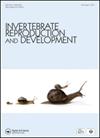Evidence of germline precursors in asexually reproducing Aeolosoma hemprichi and Aeolosoma viride (Annelida, Aeolosomatidae)
IF 0.8
4区 生物学
Q4 REPRODUCTIVE BIOLOGY
引用次数: 1
Abstract
ABSTRACT Germline precursors that can be present in asexual animals have never been characterized in aeolosomatids, minute meiofaunal Annelida usually reproducing by paratomic fission with pygidial budding. We investigated if Aeolosoma hemprichi and Aeolosoma viride still have the ability to naturally produce germ cells using an antibody raised against Vasa protein, which is a conserved germline marker. In A. hemprichi the anti-Vasa antibody recognized groups of cells floating in the coelom of the first zooid in subgroups that produce only a few eggs sporadically and also in those reproducing exclusively by paratomic fission. The presence of Vasa was also detected in the asexually formed second zooid. In A. viride, devoid of natural sexuality, the antibody evidenced randomly distributed cells in the coelomic cavity of the first zooid. Western blots of total protein extracts of adult animals of both species detected the presence of Vasa as a single band with a molecular weight corresponding to that observed in other polychaetes. The positive response of Vasa in western blots, along with the presence of labelled cells in the coelom of A. viride and in the growing zooid of A. hemprichi, suggest the ability to transmit the germline precursors asexually.无性繁殖的麻球风虫和绿风虫种系前体的证据(环节动物,风虫科)
在无性动物中存在的种系前体从未在aeolosomatids中被发现,aeolosomatids是一种微小的节肢动物,通常通过核旁分裂和核芽殖进行繁殖。我们利用一种针对Vasa蛋白的抗体(Vasa蛋白是一种保守的种系标记物),研究了麻疹风瘤和绿风瘤是否仍然具有自然产生生殖细胞的能力。在麻鼠中,抗vasa抗体可以识别漂浮在第一个动物体腔中的细胞群,这些细胞群偶尔只产生少量卵,也可以识别那些只通过旁原子裂变繁殖的细胞群。在无性形成的第二种动物中也检测到Vasa的存在。在无自然性向的绿纹田鼠中,抗体在第一种动物体腔内随机分布。两种动物的成年动物总蛋白提取物的Western blots检测到Vasa作为单个条带存在,其分子量与在其他多毛类中观察到的相同。Vasa在western blots中的阳性反应,以及在绿纹伊蚊体腔和麻疹伊蚊生长的动物体内存在标记细胞,表明其能够无性传播种系前体。
本文章由计算机程序翻译,如有差异,请以英文原文为准。
求助全文
约1分钟内获得全文
求助全文
来源期刊
CiteScore
1.90
自引率
0.00%
发文量
21
审稿时长
>12 weeks
期刊介绍:
Invertebrate Reproduction & Development ( IRD) presents original research on the reproductive and developmental biology of the Invertebrata, both embryonic and postembryonic. IRD welcomes papers reporting significant results obtained using new techniques. Encouraged topic areas include: aquaculture, physiology, biochemistry, functional morphology, phylogeny, behavioural and regulatory mechanisms, including genetic, endocrine and molecular studies. Papers containing qualitative descriptions of reproductive cycles and gametogenesis will not be considered. IRD is published in association with the International Society of Invertebrate Reproduction and Development.

 求助内容:
求助内容: 应助结果提醒方式:
应助结果提醒方式:


